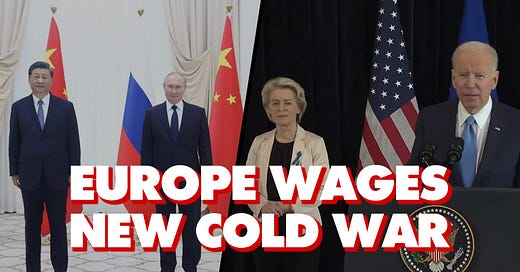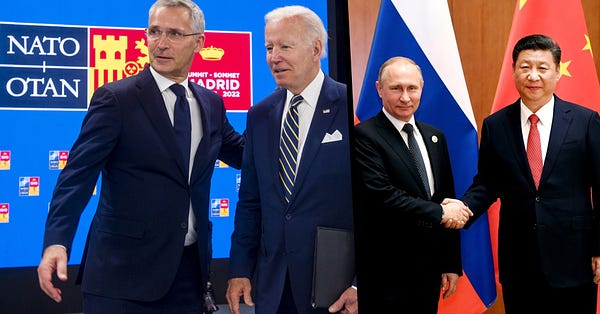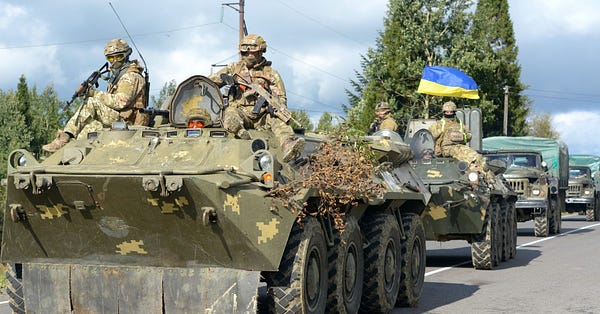EU calls China and Russia ‘threats’ in ‘war for the future of the entire world’
European Union leader Ursula von der Leyen warned China and Russia are a "global challenge" to Western hegemony. She called to weaken their influence, cut their access to raw materials, expand the EU
The European Union is waging a proxy war on Russia in Ukraine, as well as an economic war aimed at destroying Russia's economy. But Moscow is not Brussels' only target. Beijing is also in its crosshairs.
European Commission President Ursula von der Leyen made it clear that Europe sees both China and Russia as threats. And it is waging a new cold war aimed at undermining them, in order to maintain a so-called "rules-based order" dominated by Western hegemony.
Von der Leyen emphasized that the EU is raising hundreds of billions of euros to fund programs to weaken Chinese and Russian influence in Asia, Africa, and Latin America.
The EU leader portrayed the resource-rich Global South as a battlefield. She warned that the demand for raw materials needed to build renewable energy technology "will exponentially increase," and insisted that the West must prevent China from controlling those natural resources.
In an October 12 speech at the 2022 EU Ambassadors Conference in Brussels, von der Leyen declared, "Russia's failure [in Ukraine] alone will not save the rules-based global order. Because the Kremlin's revisionism is not the only nor the most serious threat to the rules-based order."
"The so-called no-limits partnership declared by Vladimir Putin and Xi Jinping is also a clear challenge to the post-war order, built on the core values of the UN Charter," the EU chief said.
"Of course, we are observing carefully the aftermath of the 20th Congress of the Chinese Communist Party to see any changes to China's international posture," she added ominously.
Von der Leyen characterized the China-Russia alliance as a threat, imploring, "we need to counter this global challenge."
She made it clear that Europe seeks to maintain its influence in "the entire world," insisting, "The war in Ukraine is not only a European war, it is a war for the future of the entire world. So Europe's horizon can only be the entire world."
Von der Leyen, a right-wing German politician, concluded her speech with nationalist fervor, proclaiming, "Long live Europe!"
The EU leader's comments echoed the positions of the US government's 2018 National Defense Strategy and NATO's 2022 Strategic Concept, which both declared China and Russia to be the West's main adversaries.
Challenging China's Belt and Road Initiative with EU's 'Global Gateway'
While much of her October 12 speech was dedicated to demonizing Russia, the EU Commission president also devoted a significant amount of time to fearmongering about China.
Von der Leyen boasted that the European Union has created an investment program, called Global Gateway, in order to challenge China's massive global infrastructure project, the Belt and Road Initiative.
She called for more funding from EU member states, to raise €300 billion for this neoliberal public-private partnership, in order to challenge Chinese and Russian influence in Asia, Africa, and Latin America.
Echoing the debunked myth of "debt-trap diplomacy," the EU leader claimed:
A ‘Belt and Road' debt crisis is now in full swing. Tens of countries are massively indebted with China. Eight of these countries - from Angola to Laos - will spend in 2022 more than 2% of their gross national income to pay their debt to China. Our Global Gateway investment programme is about giving countries a better choice, to give them an alternative.
Von der Leyen failed to mention that China has pardoned or restructured tens of billions of dollars of debt for more than a dozen countries.
(For context, Argentina is trapped in $45 billion in debt owed to the US-dominated IMF, which represents nearly 10% of its gross national income. Similarly, following a US-backed coup, Honduras was trapped in $9.25 billion of external debt, due largely to the IMF, which makes up a staggering 35% of its GNI.)
The EU chief also warned about "the Asia-Pacific, where the footprint of Chinese investment is massive." She did not acknowledge that China, unlike Europe, is actually located in the Asia-Pacific region.
"We need all continents to rise up in defence of the rules-based order," she urged.
Von der Leyen noted that she and US President Joe Biden are holding a "Leaders' Summit" to "really push forward a value-based investment agenda for the world."
'The transatlantic bond is stronger than ever' - especially because of US energy imports
The proxy war in Ukraine has pushed the United States and Europe closer together than ever, von der Leyen explained with delight in the October 12 speech.
"Never before have I experienced such an intense cooperation with the White House as I did this year," she said. "And our cooperation got even stronger in the run-up to Russia's invasion."
"Now, the transatlantic bond is stronger than ever at a crucial time for Europe," she added with a smile. "We coordinated our sanctions, round after round. We stepped up our energy coordination and energy supplies on both sides."
The EU leader emphasized that US energy exports have "made it possible for us to diversify away from Russian fossil fuels."
"It helped enormously that I had the agreement with President Biden on the LNG [liquified natural gas] and they really stepped up in delivering LNG toward the European Union," von der Leyen said.
"And like-minded partners like the United States and for example Norway have massively stepped up and helped us break free from our very dangerous dependency [on Russian energy]," she added.
The proxy war in Ukraine has created "a huge tectonic shift in the region, because we are diversifying away from Russia," she stressed.
Von der Leyen explained that, in the beginning of 2022, Russia provided Europe with 41% of its imported pipeline gas. As of October 12, that figure has decreased to just 7.5%.
"This is a huge move. This is an enormous decrease, a necessary decrease. We would have never been able to do that if it would not have been for our close friends and partners, like for example Norway and like the United States, with LNG coming in," she said.

EU leader warns that China 'dominates' raw materials needed for renewable energy technologies
In addition to Europe rapidly increasing its energy imports from the United States and Norway, von der Leyen noted that the EU signed a trilateral gas deal with Egypt and apartheid Israel, which she said "has played an important role in our strategy to get rid of the Russian fossil fuels."
But the EU chief emphasized that Europe also seeks to control the natural resources needed to develop renewable energy technologies - and many of those materials are in Africa.
Von der Leyen spelled it out:
But my visits in Cairo and Jerusalem were about much more than gas. Because our goal remains the transition away from fossil fuels. And the Mediterranean countries hold an immense potential for renewable energy.
For example, we have launched a new hydrogen partnership that looks very promising for both Europe and Egypt. And at the same time, we are working in the same direction with other northern African countries, too.
Because we know we need the energy; we need renewable energy; we need the hydrogen. And those northern African countries have all the resources that are necessary in abundance.
(While the EU chief claimed the West is defending a "rules-based order," she also unwittingly showed with these remarks how said order contradicts international law. The United Nations does not recognize Jerusalem as the capital of Israel; East Jerusalem is illegally occupied Palestinian territory, according to international law. But von der Leyen implicitly referred to Jerusalem as Israel's capital.)
Von der Leyen acknowledged in her speech that, as the world transitions to renewable energy technologies, Europe's need for the natural resources of the Global South will "exponentially increase."
The EU leader warned that there is, however, a problem: China, which she said "dominates the whole global market":
But I just want to mention the third example that shows how important these moves with our best friends are: That is raw materials.
Take lithium or take rare earth metals, they are vital for our green and digital transition. No wind turbine, no solar panel without these raw materials.
The demand for them will exponentially increase. That is for sure.
First of all, that is good news because it shows that the green transition is progressing. That is good.
The not so good news is: one country dominates the whole global market. That is China.
Strengthening EU influence in Central Asia
In order to weaken Chinese and Russian influence, von der Leyen called for the EU to boost its operations in Central Asia:
We must also step up our engagement in Central Asia. The region is a gateway between Europe, Russia and China. And it is going through an era of turbulent transformation. Some countries are pushing for reforms that seemed unthinkable just a few months ago. And they deserve all our political and economic support.
So this is the time to enhance our economic engagement in Central Asia and provide alternatives to the region to be connected to the global economy. I want Europe to be a partner for change in Central Asia. Because the global geopolitics are also changing.
You know that tectonic plates are shifting. And in times like these, we must be ready to sail uncharted waters. We must engage beyond our immediate neighbourhood and the circle of our traditional allies.
Expanding the EU into the Balkans
In the same vein, von der Leyen urged for the European Union to expand into the Balkans.
The EU leader proposed adding new member states like Ukraine, Albania, North Macedonia, Moldova, Bosnia and Herzegovina, and potentially even Georgia.
"The Western Balkans belong in our family and we have to make this very, very clear," she declared.
Calls for more sanctions on Iran
Von der Leyen also used her October 12 speech to express staunch support for violent protests in Iran, which seek to overthrow the government.
The EU chief portrayed the ongoing riots as a feminist uprising. She blamed all of the violence that is happening on both sides solely on the Iranian government, ignoring the documented attacks carried out by rioters.
She then called for more sanctions to be imposed on Tehran.
"Now is the time to sanction these people [in Iran] who are responsible," von der Leyen declared. "The shocking violence inflicted on the Iranian people cannot stay unanswered. And we have to work on sanctions together."
At least €19 billion in EU support for Ukraine since February
At the 2022 EU Ambassadors Conference, von der Leyen reiterated Brussels' undying support for Ukraine in its war with Russia.
"We, the European Union, must keep supporting Ukraine through thick and thin, for as long as it takes," she declared, adding that Ukraine was "enthusiastically" given EU candidate status.
She boasted of nine harsh sanctions packages that Europe has imposed on Russia.
Von der Leyen disclosed that the EU has provided Ukraine with at least €19 billion since February 2022.
She noted that this is a conservative estimate, as it "does not include what the European Peace Facility is giving, the equipment with military capabilities and weapons."
The United States has also given at least $60 billion in support to Ukraine, with an average of $228 million in military aid per day.









von der Leyen is the new Hitler the only thing missing is mustache!
Idiots.